外研版高中英语选修八Module1 Deep South- Reading Practice课件(41张PPT)
文档属性
| 名称 | 外研版高中英语选修八Module1 Deep South- Reading Practice课件(41张PPT) |
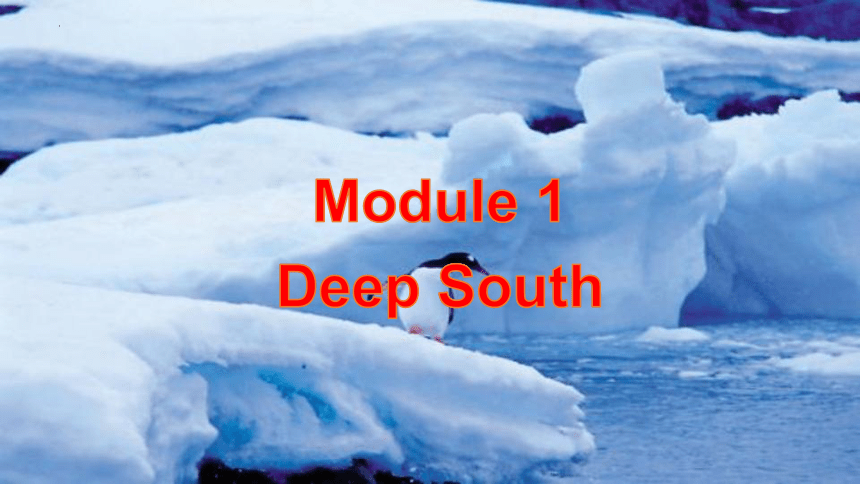
|
|
| 格式 | zip | ||
| 文件大小 | 1.9MB | ||
| 资源类型 | 教案 | ||
| 版本资源 | 外研版 | ||
| 科目 | 英语 | ||
| 更新时间 | 2022-03-09 00:00:00 | ||
图片预览

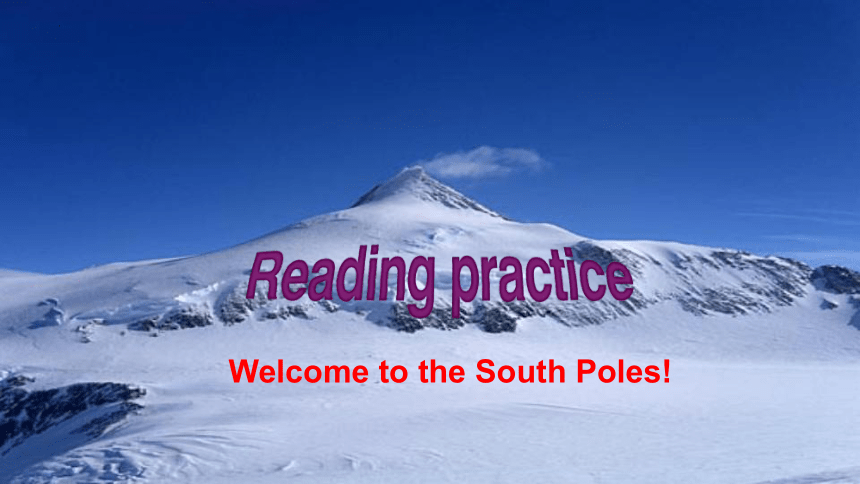

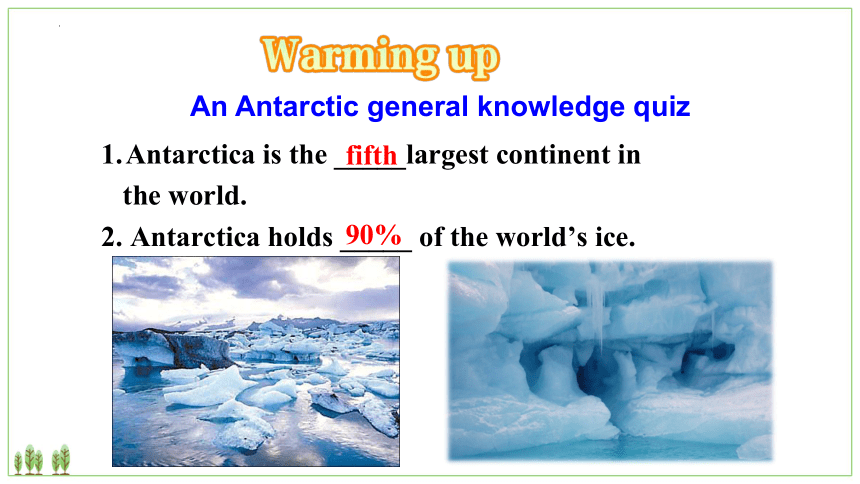
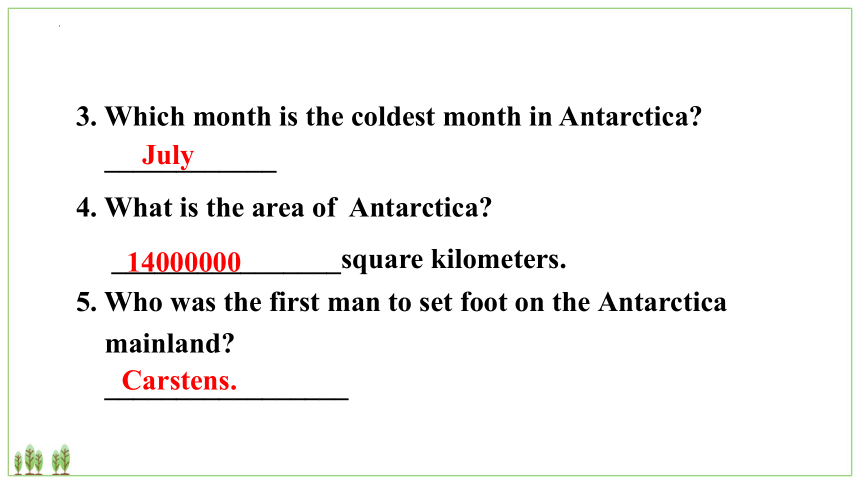
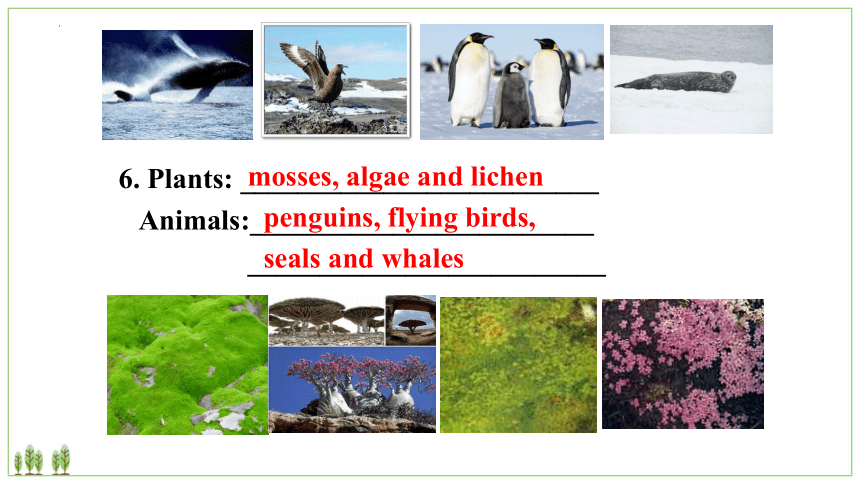
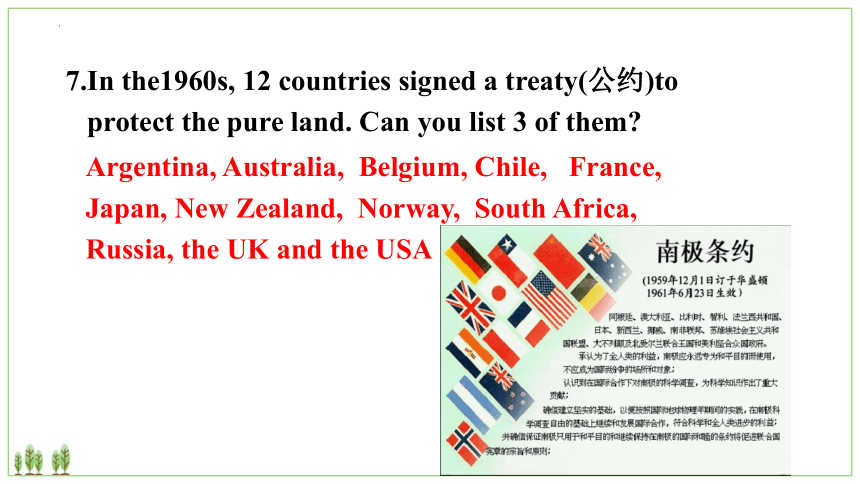
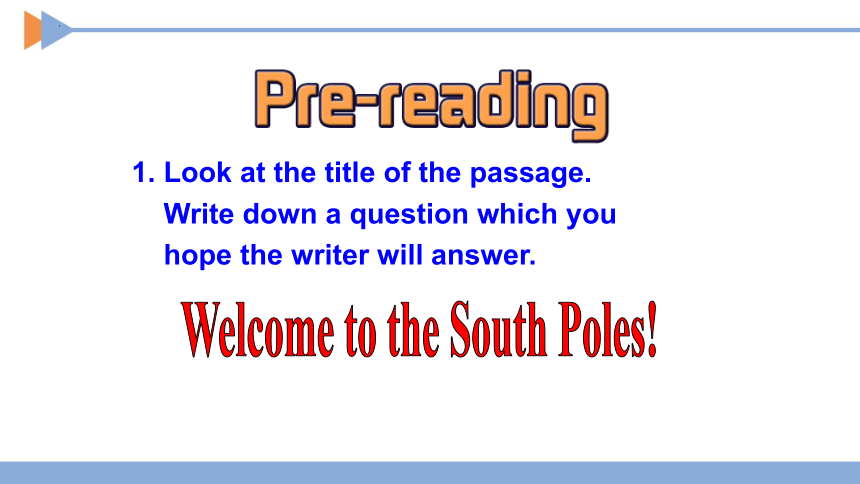
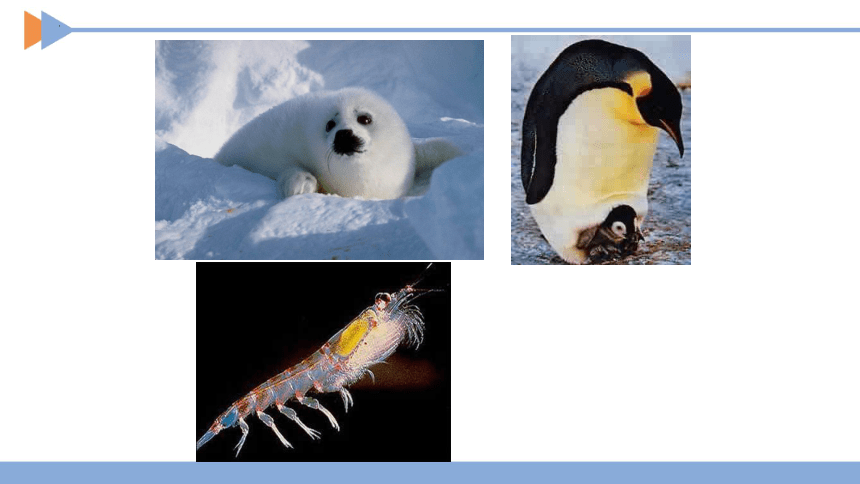
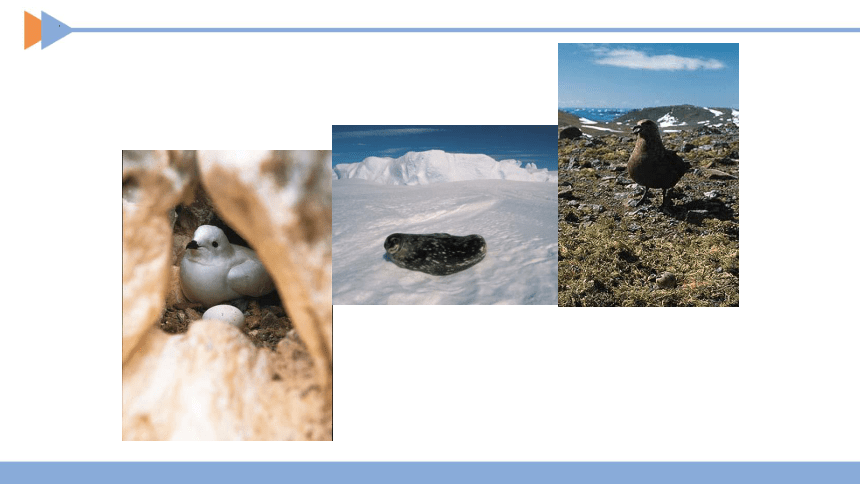
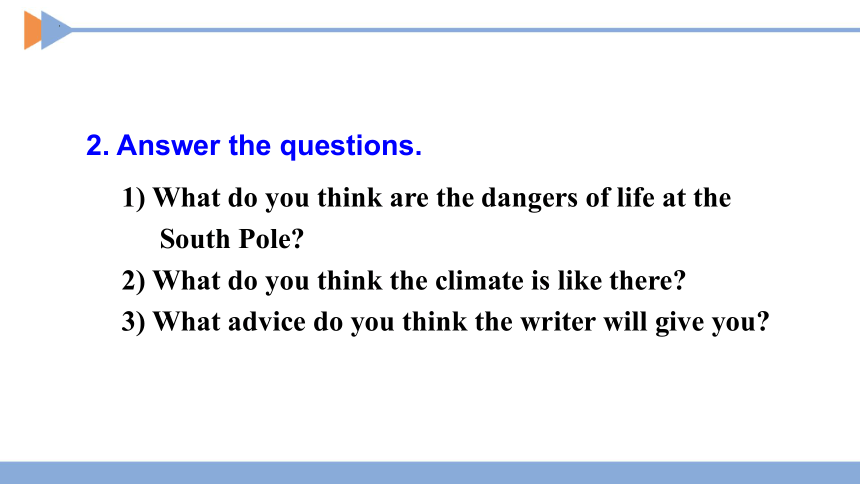
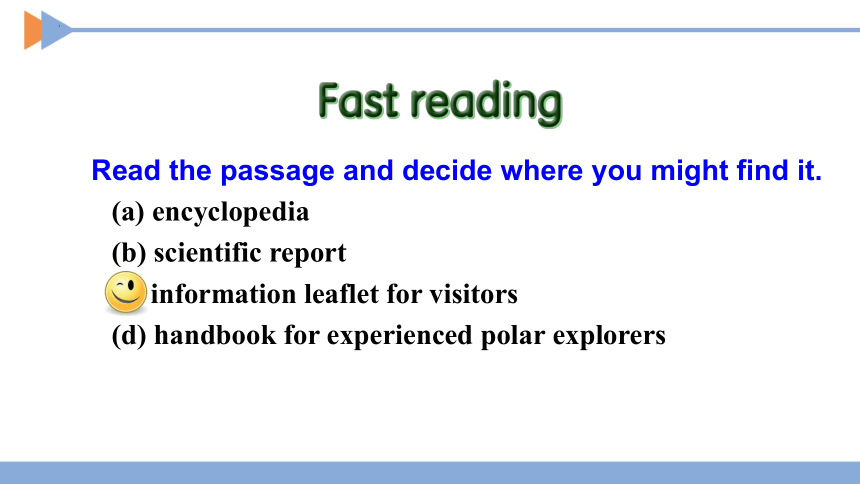
文档简介
(共41张PPT)
Module 1
Deep South
Welcome to the South Poles!
To learn more about the South Pole.
To learn useful words and expressions.
Antarctica is the _____largest continent in
the world.
2. Antarctica holds _____ of the world’s ice.
fifth
An Antarctic general knowledge quiz
90%
3. Which month is the coldest month in Antarctica
____________
4. What is the area of Antarctica
________________square kilometers.
5. Who was the first man to set foot on the Antarctica
mainland
_________________
July
14000000
Carstens.
6. Plants: _________________________
Animals:________________________
_________________________
penguins, flying birds,
seals and whales
mosses, algae and lichen
7.In the1960s, 12 countries signed a treaty(公约)to
protect the pure land. Can you list 3 of them
Argentina, Australia, Belgium, Chile, France,
Japan, New Zealand, Norway, South Africa,
Russia, the UK and the USA
1. Look at the title of the passage.
Write down a question which you
hope the writer will answer.
Welcome to the South Poles!
1) What do you think are the dangers of life at the South Pole
2) What do you think the climate is like there
3) What advice do you think the writer will give you
2. Answer the questions.
Read the passage and decide where you might find it.
(a) encyclopedia
(b) scientific report
(c) information leaflet for visitors
(d) handbook for experienced polar explorers
choose the right answers.
1. The South Pole is safe __________.
A. as long as you take precautions to protect yourself
B. because it’s at 3,000-4,000 metres high
C. because it’s the calmest place on Earth
D. because visitors are careful to protect its ecology
A
2. The scientific station _________.
A. is surprisingly luxurious
B. is cosy but has some restrictions on personal lifestyle, such as a shortage of water
C. provides perfect accommodation for long-term visitors
D. has very basic equipment and is unlike living anywhere else in the world
B
3. The ceremonial Pole is probably ______.
A. the coldest place in the Antarctic
B. the place which explorers first claimed as the true South Pole
B. the place from where all routes lead North
D. close to the scientific station, where visitors to the South Pole have their photos taken
D
4. Sunrise and sunset come once every six months means
_______.
A. each day and night lasts six months
B. there’s daylight for six months, then darkness for six
months
C. there’s so little to do that a day seems to last six months
D. a day with a sunrise and a sunset only happens once
every six months
B
5. The environment of the Antarctic is very special, so visitors _______.
A. consider it a right to be allowed to go there
B. only buy souvenirs from the scientific station, and do not take anything else away
C. should stay away, and only animals should live there
D. should not take anything away which belongs there, and should take their possessions and rubbish when they leave
D
Read the text (P11) carefully and fill in the blanks.
Three South Poles A ceremonial Pole, a geographical or true Pole, and a(n) 1. ________ Pole.
The climate ☆The temperature is between minus 21℃ and minus 78℃.
☆Even on the warmest summer days there is heavy 2. ________.
☆There’s very little wind.
☆It snows only about four millimetres a year.
magnetic
frost
Life Life is quite 3. ________, for sunrise and sunset come once every six months, and in the winter people there are totally isolated except for radio and electronic communications.
The scientific station ☆It’s located on a platform of ice.
☆A minimum of 4. ________ people live there in the winter and a maximum of 125 in the summer.
☆The living quarters are comfortable with a dormitory, a canteen and a well-stocked library of DVDs and videos. But 5. ________ and laundry are limited.
abnormal
28
showers
Advice ☆Remember to wear sunglasses and use 6. ________ if you go outside.
☆Dress warmly and carry dry clothing and a portable radio if you leave the station.
☆Remember 7. ______________________ doesn’t always work as it should do.
☆Don’t leave any rubbish, and don’t take any souvenirs home with you.
☆Remember it’s a(n) 8. ________ for us to come to the South Pole.
suncream
conventional equipment
privilege
Read the passage carefully and find the supporting ideas.
Paragraph Main idea Supporting ideas
South Poles How many are there
There are three South Poles.
1. a ceremonial pole
2. a geographical pole
3. a magnetic pole
Paragraph Main idea Supporting ideas
Is it safe
There’s a severe risk that you will damage your eyesight or get badly sunburnt.
1. high altitude
intense sunlight
2. sunlight reflected by the snow
Paragraph Main idea Supporting ideas
Is there anything good about the weather
It’s possibly the calmest place on Earth.
1. The air is very pure.
2. It doesn’t snow very much.
3. There’s very little wind and
the sky is usually clear.
Paragraph Main idea Supporting ideas
What’s it like to live here
Life is quite abnormal.
1. Sunrise and sunset every six months, total absence of daylight in the winter.
2. totally isolated.
Paragraph Main idea Supporting ideas
Where do we live
The South Pole scientific is situated on a
platform of ice.
1. a min of 28 people citing here in the winter and a max of 125 people in the summer.
2. The living quarters are modest, with few luxuries, but cosy.
Paragraph Main idea Supporting ideas
Any other advice
There are some important things to remember in the South Pole.
1. Conventional equipment
doesn’t always work as it should do.
2. Don’t leave any rubbish.
3. Remember it’s a privilege to be here.
Complete the sentences about life at the South Pole in your own words.
1) If you aren’t careful in the open air,
_________________________________
2) If you don’t like long, dark winters,
________________________________
you will get numb without realising it.
you might find it depressing.
3) If you don’t like living with lots of people,
___________________
you’d better not go.
4) If you like personal comforts, ___________________
_______________
5) If you use conventional tools and technical
equipment, ___________________________________
6) If you don’t take home everything you brought with
you, _______________________________________
you will find it is almost impossible.
you might destroy the ecology of Antarctica.
you will find life difficult.
1. …the glare of the sunlight here is very intense.
这里太阳的强光是很强烈的。
glare v. 怒视,瞪 (常与介词at连用)
e.g. The teacher glared at the troublemaker.
老师怒视捣乱者。
v. 发耀眼的强光
e.g. The sun glared out of the blue sky.
太阳从蓝天中发出耀眼的光芒。
n. 刺眼的强光,令人不快的光 (用作不可数名词)
e.g. We could see nothing because of the glare of the
car’s lights.
由于汽车的灯光刺眼,我们什么也看不见。
怒视的目光,愤怒的表情(用作可数名词)
e.g. There was an angry glare in the boy’s eyes.
那男孩怒目而视。
2. …and you can become numb with cold without
realising.
在没有意识的情况下你会冻得麻木。
numb adj. 失去感觉的,麻木的
e.g. fingers numb with cold
冻僵了的手指
She was numb with terror.
她吓得不能动了。
numb v. 使(人/物)失去感觉,麻木;使(人)麻木不仁(常用被动)
e.g. His leg was numbed by the intense pain.
他的腿因剧痛而麻木。
She was completely/the roughly numbed by the
shock of her father’s death.
她父亲去世造成的打击使她懵了。
3. …and in the winter the total absence of daylight can be
tiresome, and for some, depressing.
在冬天整天不见阳光的日子很令人心烦, 并且有一些让
人感到很压抑。
absence n. 缺乏, 没有
e.g. He made up a wonderful story to explain his absence.
他编造了一个奇妙的故事来说明他缺席的理由。
【归纳】
absence from work / school 缺勤/缺课
absence of mind 心不在焉
in one’s absence=in the absence of 在某人不在时
【拓展】
absent adj. 缺席的, 不在的, 缺乏的
(反义词)present adj. 出席的
be absent from 缺席, 缺乏
be absent in 表示离开说话人所在地,在另一地
【语境应用】根据提示完成下面句子。
1) Her brother took away her new book
_________________________ (在她不在时).
2) Joe was punished because he had so many _________________________ (缺课).
3) _____________________________ (由于缺乏信息), we were unable to solve the problem.
4) The police were delayed by the _________ (absent) of information about the crime.
in / during her absence
absences from class / school
In the absence of information
absence
4. We discourage you from smoking except in specific areas.
除了在一些特殊的区域, 我们劝你不要抽烟。
discourage vt. 使泄气; 使气馁;
阻止; 打消……的念头
vi. 灰心, 失去勇气
e.g. He was discouraged from giving up the job.
他被劝阻不要放弃这项工作。
【归纳】
discourage sb. from doing sth.
打消某人做某事的念头; 使某人失去做某事的信心
【拓展】
discouraged adj. 沮丧的, 灰心丧气的
discouraging adj. 令人泄气的,
令人沮丧的
discouragement n. 沮丧, 灰心丧气;
挫折, 阻拦
【联想】
courage n. 勇气
encourage v. 鼓励
encourage sb. to do sth.
鼓励某人做某事
【语境应用】根据汉语提示补全下面句子(每空
一词, 含缩略形式)。
1) ________ __________ ________ (别泄她的气); she’s doing her best.
2) His father ____________ ________ ________ ________ ________ ________ (阻止他参加) the activity, because he thought it was a waste of time.
3) I think he must _______ __________ (感到沮丧) because of all the criticism he has received.
Don’t discourage her
discouraged him from
feel discouraged
taking part in
Imagine you visited the South Pole
scientific station. Write a short visitor’s
report describing what life was like for you.
Module 1
Deep South
Welcome to the South Poles!
To learn more about the South Pole.
To learn useful words and expressions.
Antarctica is the _____largest continent in
the world.
2. Antarctica holds _____ of the world’s ice.
fifth
An Antarctic general knowledge quiz
90%
3. Which month is the coldest month in Antarctica
____________
4. What is the area of Antarctica
________________square kilometers.
5. Who was the first man to set foot on the Antarctica
mainland
_________________
July
14000000
Carstens.
6. Plants: _________________________
Animals:________________________
_________________________
penguins, flying birds,
seals and whales
mosses, algae and lichen
7.In the1960s, 12 countries signed a treaty(公约)to
protect the pure land. Can you list 3 of them
Argentina, Australia, Belgium, Chile, France,
Japan, New Zealand, Norway, South Africa,
Russia, the UK and the USA
1. Look at the title of the passage.
Write down a question which you
hope the writer will answer.
Welcome to the South Poles!
1) What do you think are the dangers of life at the South Pole
2) What do you think the climate is like there
3) What advice do you think the writer will give you
2. Answer the questions.
Read the passage and decide where you might find it.
(a) encyclopedia
(b) scientific report
(c) information leaflet for visitors
(d) handbook for experienced polar explorers
choose the right answers.
1. The South Pole is safe __________.
A. as long as you take precautions to protect yourself
B. because it’s at 3,000-4,000 metres high
C. because it’s the calmest place on Earth
D. because visitors are careful to protect its ecology
A
2. The scientific station _________.
A. is surprisingly luxurious
B. is cosy but has some restrictions on personal lifestyle, such as a shortage of water
C. provides perfect accommodation for long-term visitors
D. has very basic equipment and is unlike living anywhere else in the world
B
3. The ceremonial Pole is probably ______.
A. the coldest place in the Antarctic
B. the place which explorers first claimed as the true South Pole
B. the place from where all routes lead North
D. close to the scientific station, where visitors to the South Pole have their photos taken
D
4. Sunrise and sunset come once every six months means
_______.
A. each day and night lasts six months
B. there’s daylight for six months, then darkness for six
months
C. there’s so little to do that a day seems to last six months
D. a day with a sunrise and a sunset only happens once
every six months
B
5. The environment of the Antarctic is very special, so visitors _______.
A. consider it a right to be allowed to go there
B. only buy souvenirs from the scientific station, and do not take anything else away
C. should stay away, and only animals should live there
D. should not take anything away which belongs there, and should take their possessions and rubbish when they leave
D
Read the text (P11) carefully and fill in the blanks.
Three South Poles A ceremonial Pole, a geographical or true Pole, and a(n) 1. ________ Pole.
The climate ☆The temperature is between minus 21℃ and minus 78℃.
☆Even on the warmest summer days there is heavy 2. ________.
☆There’s very little wind.
☆It snows only about four millimetres a year.
magnetic
frost
Life Life is quite 3. ________, for sunrise and sunset come once every six months, and in the winter people there are totally isolated except for radio and electronic communications.
The scientific station ☆It’s located on a platform of ice.
☆A minimum of 4. ________ people live there in the winter and a maximum of 125 in the summer.
☆The living quarters are comfortable with a dormitory, a canteen and a well-stocked library of DVDs and videos. But 5. ________ and laundry are limited.
abnormal
28
showers
Advice ☆Remember to wear sunglasses and use 6. ________ if you go outside.
☆Dress warmly and carry dry clothing and a portable radio if you leave the station.
☆Remember 7. ______________________ doesn’t always work as it should do.
☆Don’t leave any rubbish, and don’t take any souvenirs home with you.
☆Remember it’s a(n) 8. ________ for us to come to the South Pole.
suncream
conventional equipment
privilege
Read the passage carefully and find the supporting ideas.
Paragraph Main idea Supporting ideas
South Poles How many are there
There are three South Poles.
1. a ceremonial pole
2. a geographical pole
3. a magnetic pole
Paragraph Main idea Supporting ideas
Is it safe
There’s a severe risk that you will damage your eyesight or get badly sunburnt.
1. high altitude
intense sunlight
2. sunlight reflected by the snow
Paragraph Main idea Supporting ideas
Is there anything good about the weather
It’s possibly the calmest place on Earth.
1. The air is very pure.
2. It doesn’t snow very much.
3. There’s very little wind and
the sky is usually clear.
Paragraph Main idea Supporting ideas
What’s it like to live here
Life is quite abnormal.
1. Sunrise and sunset every six months, total absence of daylight in the winter.
2. totally isolated.
Paragraph Main idea Supporting ideas
Where do we live
The South Pole scientific is situated on a
platform of ice.
1. a min of 28 people citing here in the winter and a max of 125 people in the summer.
2. The living quarters are modest, with few luxuries, but cosy.
Paragraph Main idea Supporting ideas
Any other advice
There are some important things to remember in the South Pole.
1. Conventional equipment
doesn’t always work as it should do.
2. Don’t leave any rubbish.
3. Remember it’s a privilege to be here.
Complete the sentences about life at the South Pole in your own words.
1) If you aren’t careful in the open air,
_________________________________
2) If you don’t like long, dark winters,
________________________________
you will get numb without realising it.
you might find it depressing.
3) If you don’t like living with lots of people,
___________________
you’d better not go.
4) If you like personal comforts, ___________________
_______________
5) If you use conventional tools and technical
equipment, ___________________________________
6) If you don’t take home everything you brought with
you, _______________________________________
you will find it is almost impossible.
you might destroy the ecology of Antarctica.
you will find life difficult.
1. …the glare of the sunlight here is very intense.
这里太阳的强光是很强烈的。
glare v. 怒视,瞪 (常与介词at连用)
e.g. The teacher glared at the troublemaker.
老师怒视捣乱者。
v. 发耀眼的强光
e.g. The sun glared out of the blue sky.
太阳从蓝天中发出耀眼的光芒。
n. 刺眼的强光,令人不快的光 (用作不可数名词)
e.g. We could see nothing because of the glare of the
car’s lights.
由于汽车的灯光刺眼,我们什么也看不见。
怒视的目光,愤怒的表情(用作可数名词)
e.g. There was an angry glare in the boy’s eyes.
那男孩怒目而视。
2. …and you can become numb with cold without
realising.
在没有意识的情况下你会冻得麻木。
numb adj. 失去感觉的,麻木的
e.g. fingers numb with cold
冻僵了的手指
She was numb with terror.
她吓得不能动了。
numb v. 使(人/物)失去感觉,麻木;使(人)麻木不仁(常用被动)
e.g. His leg was numbed by the intense pain.
他的腿因剧痛而麻木。
She was completely/the roughly numbed by the
shock of her father’s death.
她父亲去世造成的打击使她懵了。
3. …and in the winter the total absence of daylight can be
tiresome, and for some, depressing.
在冬天整天不见阳光的日子很令人心烦, 并且有一些让
人感到很压抑。
absence n. 缺乏, 没有
e.g. He made up a wonderful story to explain his absence.
他编造了一个奇妙的故事来说明他缺席的理由。
【归纳】
absence from work / school 缺勤/缺课
absence of mind 心不在焉
in one’s absence=in the absence of 在某人不在时
【拓展】
absent adj. 缺席的, 不在的, 缺乏的
(反义词)present adj. 出席的
be absent from 缺席, 缺乏
be absent in 表示离开说话人所在地,在另一地
【语境应用】根据提示完成下面句子。
1) Her brother took away her new book
_________________________ (在她不在时).
2) Joe was punished because he had so many _________________________ (缺课).
3) _____________________________ (由于缺乏信息), we were unable to solve the problem.
4) The police were delayed by the _________ (absent) of information about the crime.
in / during her absence
absences from class / school
In the absence of information
absence
4. We discourage you from smoking except in specific areas.
除了在一些特殊的区域, 我们劝你不要抽烟。
discourage vt. 使泄气; 使气馁;
阻止; 打消……的念头
vi. 灰心, 失去勇气
e.g. He was discouraged from giving up the job.
他被劝阻不要放弃这项工作。
【归纳】
discourage sb. from doing sth.
打消某人做某事的念头; 使某人失去做某事的信心
【拓展】
discouraged adj. 沮丧的, 灰心丧气的
discouraging adj. 令人泄气的,
令人沮丧的
discouragement n. 沮丧, 灰心丧气;
挫折, 阻拦
【联想】
courage n. 勇气
encourage v. 鼓励
encourage sb. to do sth.
鼓励某人做某事
【语境应用】根据汉语提示补全下面句子(每空
一词, 含缩略形式)。
1) ________ __________ ________ (别泄她的气); she’s doing her best.
2) His father ____________ ________ ________ ________ ________ ________ (阻止他参加) the activity, because he thought it was a waste of time.
3) I think he must _______ __________ (感到沮丧) because of all the criticism he has received.
Don’t discourage her
discouraged him from
feel discouraged
taking part in
Imagine you visited the South Pole
scientific station. Write a short visitor’s
report describing what life was like for you.
